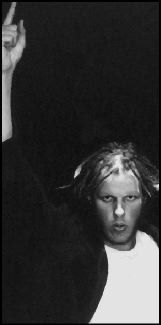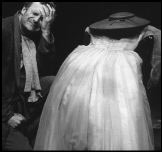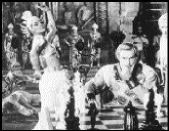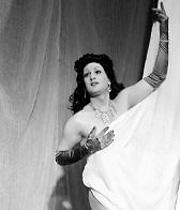UTILITIES
Northwest Actors Studio, 1100 E. Pike, 324-6328. $12 8:30 p.m. Thurs.-Sat. ends Sat., Oct. 20
WHEN A ROOM in San Francisco becomes available for only $600 a month, perhaps you shouldn’t ask how it became available. This twisted premise binds Bay Area performer George McKibbens’ solo show, in which he plays both the landlord and the series of prospective tenants who inspect—and decline—the room. Their shock isn’t at the bloodstains on the bathroom floor or the creepy man’s impertinent questions (“Do you eat meat?”), but rather his request that they dance with him while wearing his murdered daughter’s red dress.
We first meet the landlord dancing with the slain girl’s dress, while the phone rings off the hook with people responding to his ad for her now vacant room. As he queries them, a minor noble listening to petitions, we learn of his ex-wife’s restraining order and watch him fade in and out of fantasy. There is little doubt that he is his daughter’s killer.
Having captured our attention, McKibbens keeps it for the full hour with his darkly comic, Bogosian-esque characters—the streetwise Filipino DJ who asks to pay his deposit with a custom mix, the Chicano dot-com hustler shouting into his cell phone, the English law student turned stripper, et al. McKibbens, a pierced, hulking young slam poet with a deep voice, bleach-stressed hair, and wispy beard, brings to his characters the dramatist’s strength of quirky detail, like the persimmons his warped redneck offers or the babbling young girl’s shy squeak.
The apartment hunt is an inspired, equalizing choice for McKibbens to snare his urban menagerie. The dance in the red dress is a gimmick, too—albeit a good one—that furnishes narrative webbing and gets each character off the stage easily and predictably. The smell of the street that hangs on all his characters lends authenticity even as it suggests a limited acting range. Adding to atmosphere (although not necessarily to our enjoyment) is the preshow poetry reading from a rotating set of his friends.
The real value of Utilities is its portrait of the city—specifically McKibbens’ San Francisco—through these wry portrayals. In that, there is great utility, indeed.








